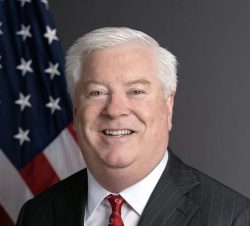Polish Ambassador To Japan Reflects On Independence; In 1918 Poland Became Free From Russia, Other Empires
7:00 JST, November 13, 2024
Poland celebrated its Independence Day on Nov. 11. In the following contribution to The Japan News, Polish Ambassador Pawel Milewski writes about the significance of independence from both a historical and contemporary perspective.
***

Pawel Milewski
As silence fell over Europe’s trenches and battlefields on the 11th of November in 1918, World War I came to an end and a miracle occurred in Central Europe. After 123 years of foreign domination, Poland became once again an independent nation. Japan was one of the first countries to recognize our independence.
We call independence a miracle because it was possible thanks to some truly extraordinary circumstances: The three empires that once had divided and swallowed our country — Germany, Russia and Austria-Hungary — all collapsed at the same time. How unlikely was that? Since then, we have celebrated the 11th of November as Poland’s Independence Day.
At the same time, our rebirth as a nation was accompanied by the emergence of a new rule, which would form a fundamental principle of the global international order — the right of national self-determination.
Today we know that the will to exercise the right of national self-determination is an unstoppable force shaping and driving world history. The concept of an empire, understood as a political organism uniting various ethnic groups through the use of central administration and military power, became obsolete. This was reflected by the gradual decline and fall of colonialism, culminating in 1991 in the dissolution of the Soviet Union, which was, let’s not forget, also a colonial power.
Unfortunately, Russia, the successor state of the Soviet Union, never truly came to terms with the fall of its empire nor managed to truly redefine itself as a modern nation-state. As its invasion against Ukraine clearly demonstrates, Russia still believes that nations can be conquered and subdued. It is mistaken.
The circumstances of Poland’s rebirth in 1918 may have been miraculous, yet the end result was inevitable. Nothing on earth, short of total physical extermination, can subdue a nation that is determined to achieve freedom. It can never be truly broken by the ambitions of any individual; its patience is inexhaustible, and time is always on its side.
Such thoughts are nevertheless unacceptable to the tenants of the Kremlin, and for a good reason — despite various rebranding efforts (such as the “Russkiy Mir” concept and the Commonwealth of Independent States) Russia still is at heart a colonial power. The implications of this fact should be noted by the international community. The gradual erosion of Russia’s colonial sphere of influence and its struggle to turn the tide of history were already the reasons behind the war with Georgia in 2008, the suppression of popular protests in Belarus in 2020, and now the war against Ukraine. It may also be a source of instability in the future.
Polish Independence Day should remind us how futile it is to fight against the freedom aspirations of a nation. Remember that a little over a hundred years ago a midsized Poland managed to liberate itself against the will of the three of the most powerful empires in the world. May that bring hope and optimism to us all. History is on our side.
Top Articles in Editorial & Columns
-

Riku-Ryu Pair Wins Gold Medal: Their Strong Bond Leads to Major Comeback Victory
-

40 Million Foreign Visitors to Japan: Urgent Measures Should Be Implemented to Tackle Overtourism
-

China Provoked Takaichi into Risky Move of Dissolving House of Representatives, But It’s a Gamble She Just Might Win
-

University of Tokyo Professor Arrested: Serious Lack of Ethical Sense, Failure of Institutional Governance
-

Policy Measures on Foreign Nationals: How Should Stricter Regulations and Coexistence Be Balanced?
JN ACCESS RANKING
-

Japan PM Takaichi’s Cabinet Resigns en Masse
-

Japan Institute to Use Domestic Commercial Optical Lattice Clock to Set Japan Standard Time
-

Israeli Ambassador to Japan Speaks about Japan’s Role in the Reconstruction of Gaza
-

Man Infected with Measles Reportedly Dined at Restaurant in Tokyo Station
-

Videos Plagiarized, Reposted with False Subtitles Claiming ‘Ryukyu Belongs to China’; Anti-China False Information Also Posted in Japan























